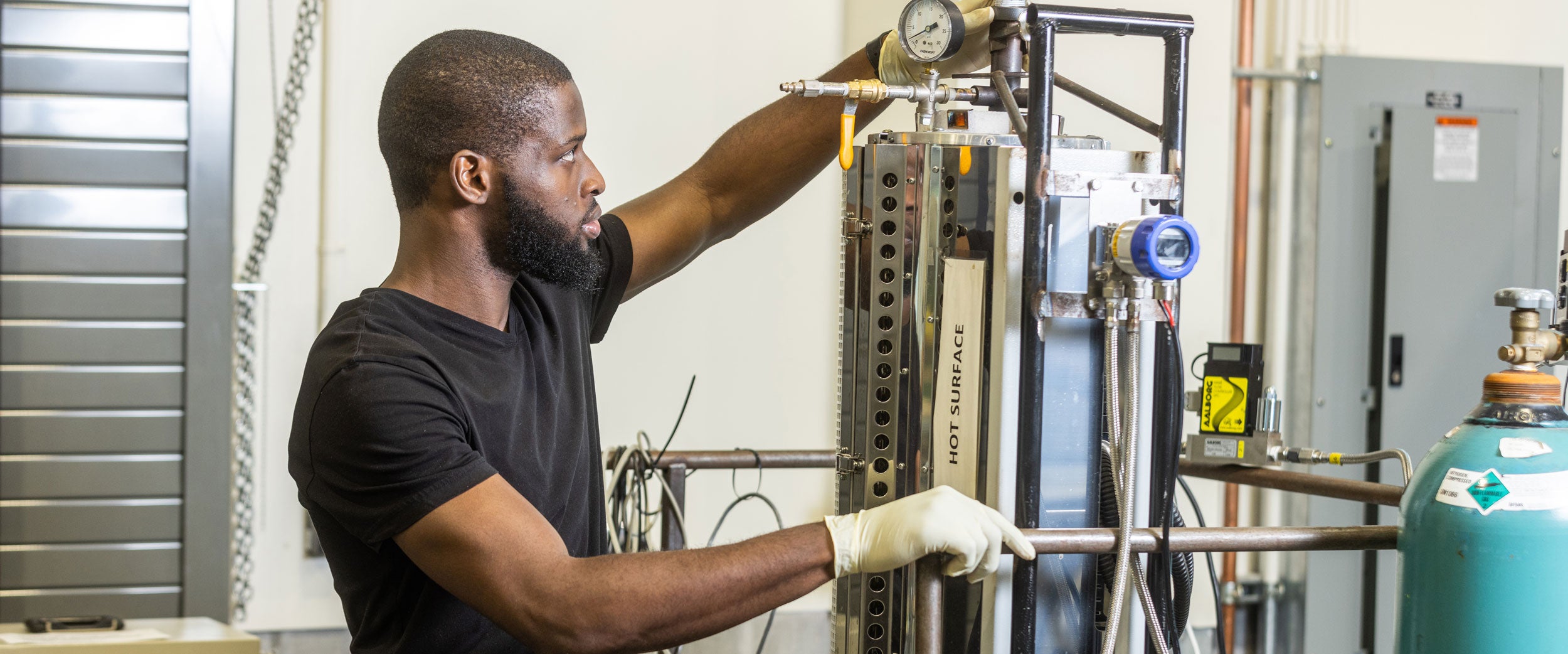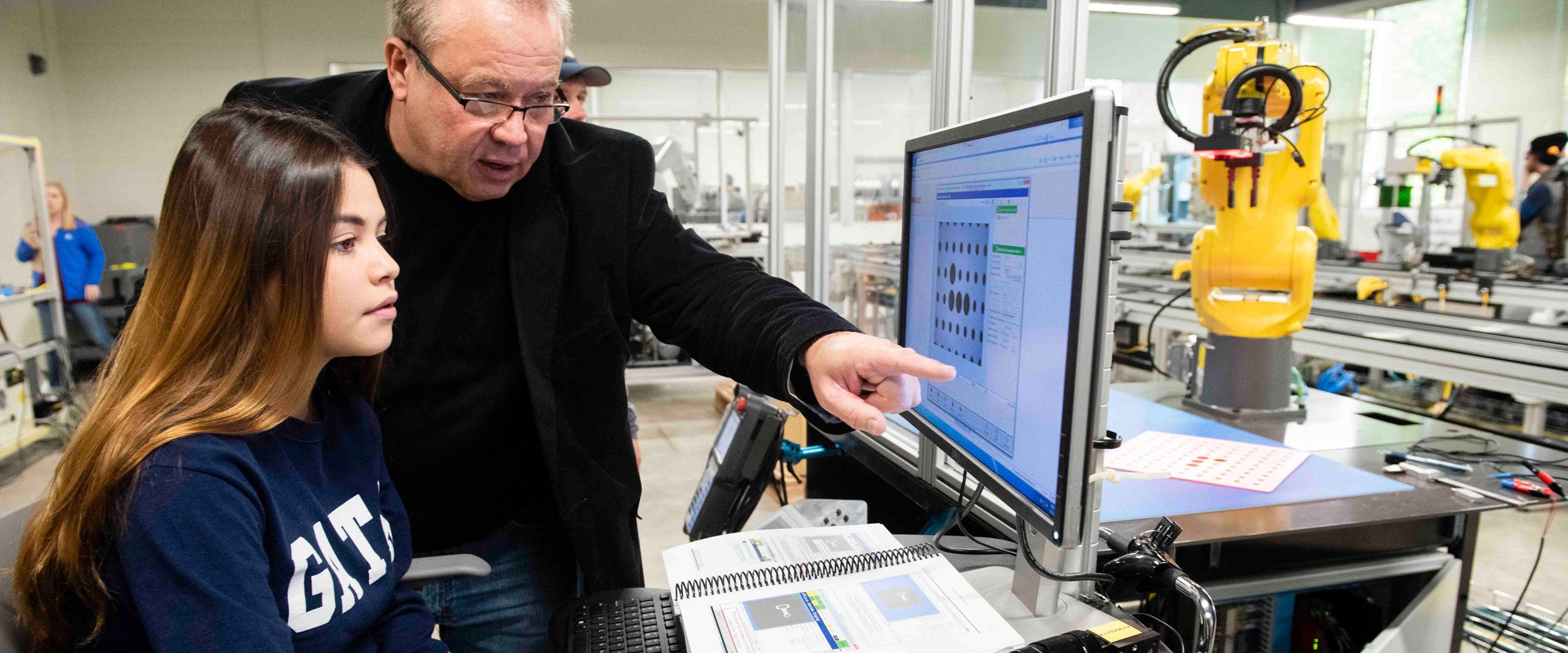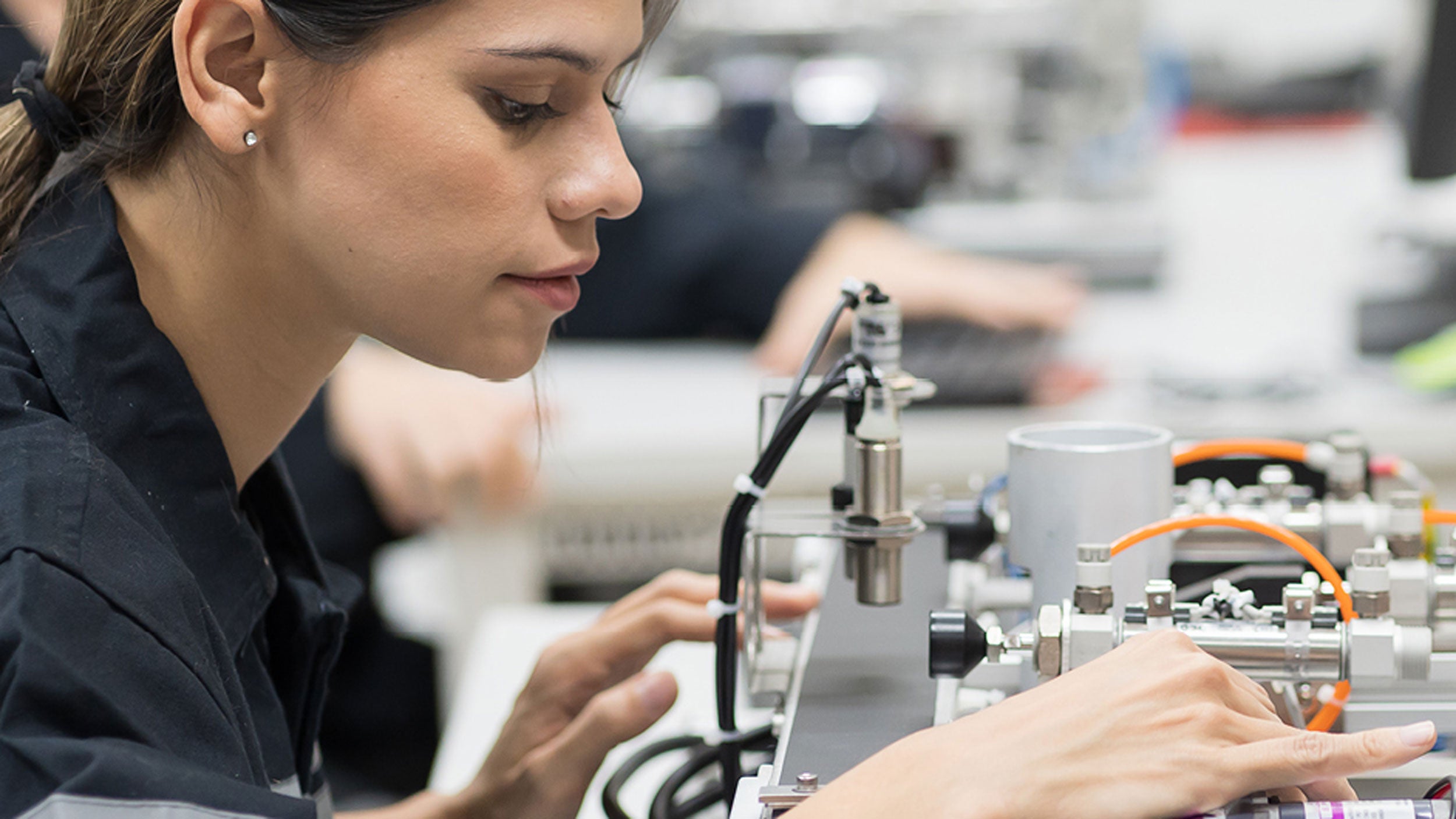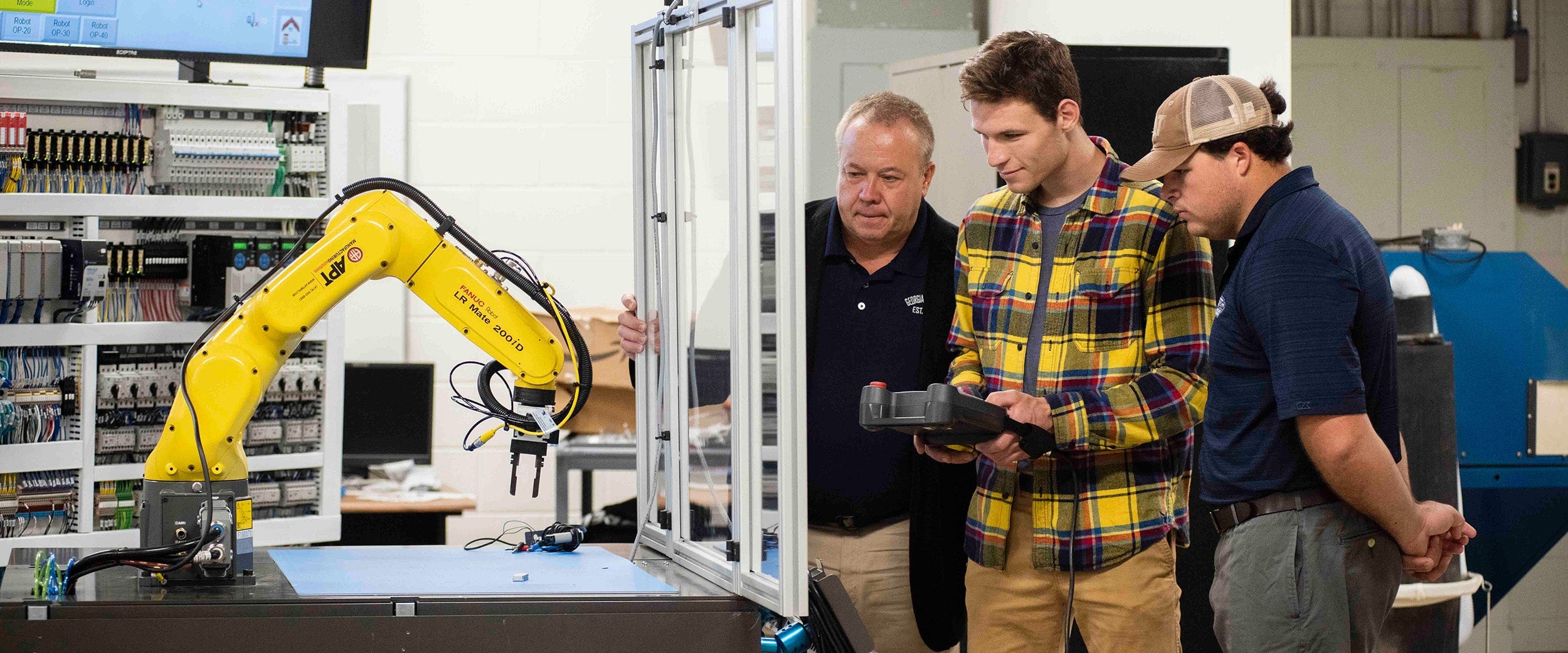Mechanical engineers make the things that make our world happen. Be part of a program where you’ll prepare to join them.
Locations
- Statesboro Campus (In Person)
- Armstrong Campus (Lower Division Courses Only)
Why Major in Mechanical Engineering at Georgia Southern?
- Learn in our new 135,000-square-foot Engineering and Research Building.
- ABET-accredited program.
- Complete your master’s in just five years with our accelerated bachelor’s-to-master’s pathway.
- One of Georgia Southern’s most popular undergraduate majors.
- 130 credit hours to completion.
Of all the disciplines, mechanical engineering covers the broadest spectrum. If you’re passionate about solving problems and building things, you’ll have a chance to forge a foundation for your future starting as soon as you arrive at Georgia Southern.
You’ll hone skills in both mechanical and thermal systems that you can apply to several areas, including energy, materials, transportation, health, manufacturing and consumer products. And you’ll do it while learning in our new Engineering and Research Building. This 135,000-square-foot facility is home to 21 instructional research labs, including ones devoted to nanomaterials and manufacturing, renewable energy and more subdisciplines.
Throughout, you’ll learn while working alongside experienced faculty who serve not just as instructors but as mentors. In fact, faculty — not teaching assistants — teach all of the College of Engineering and Computing’s undergraduate classes.
Ready to Apply?
What Can You Do With a BS in Mechanical Engineering?
It’s a safe bet that, at this moment, a mechanical engineer had something to do with nearly any object, system or device within your arm’s reach. And they’re in constant demand. Our graduates go on to careers in fields such as energy, materials, transportation, health, manufacturing and consumer products.
Where our graduates work:
- Boeing
- Briggs & Stratton
- Georgia Power
- Gulfstream Aerospace
- JTEKT/Koyo Bearings
- Lockheed Martin
- Nordson
- Tesla
What our graduates do:
- Design Engineer
- Mechanical Systems Engineer
- Project Manager
- Sales Engineer
What You’ll Learn
As a mechanical engineering major at Georgia Southern, you’ll focus on both theory and practice. Classwork introduces you to foundational topics such as calculus, physics, fluid mechanics, thermodynamics and materials science. Then, you’ll have the option of specializing in a discipline such as Vehicle Design, Renewable Energy, Robotics, Materials Development or Metal Casting.
See the CurriculumEmphasis Areas
Take the lead on what you study: Choose an emphasis in vehicle design and testing or metal casting, or take electives that allow you to explore the breadth of the field.
Vehicle Design and Testing
Cleaner. Faster. Lighter. If you choose an emphasis in vehicle design and testing, you’ll study topics such as automotive engineering, vehicle dynamics, applied combustion and engine development and performance.
Metal Casting
Metal was a harbinger of civilization as we know it — and thousands of years later, engineers are still advancing the state of the art. In this emphasis, you’ll learn about topics such as molten metal processes, metal casting and advanced manufacturing materials.
Build Your Experience
Doing is at the core of Georgia Southern’s engineering programs. Student groups, hands-on internships, co-ops and other opportunities give you the experience employers want to see.
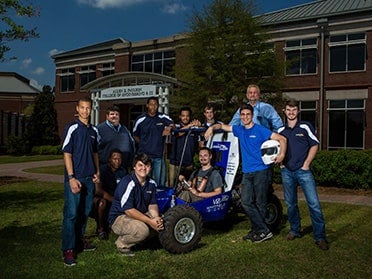
SAE Competitions
Build, design and test vehicles with Eagle Motorsports, Georgia Southern’s own racing team. Compete in on-road and off-road collegiate competitions sponsored by the Society of Automotive Enginees (SAE).
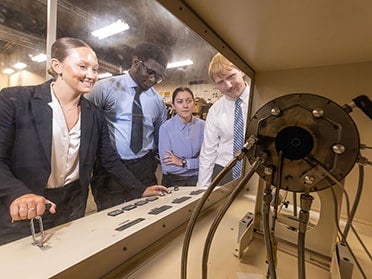
Student Organizations
Build your network and meet fellow engineers when you join student groups such as the American Society of Mechanical Engineers, National Society of Black Engineers and Pi Tau Sigma Mechanical Engineering Honor Society.
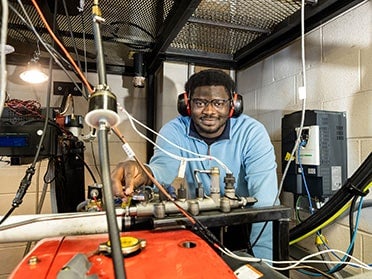
Internships and Co-ops
Internships and co-ops deliver valuable, real-world experiences — and can even lead to job offers once you graduate. Our Office of Career and Professional Development can help you find an opportunity that’s right for you.
Want to Learn More?
Explore essential information about our BSN program, including application details, accreditation status, and licensing disclosures. Gain insight into the program’s credibility and requirements to help you start your journey toward success with the knowledge you need.
Follow these steps to complete the Georgia Southern application:
- Create an application account.
- Complete our online application using the PIN you received after creating your application account.
- Once complete, pay the $30 application fee or upload a valid fee waiver. Previous Georgia Southern applicants and dual enrollment students do not need to pay the fee.
You can check your application status at My.GeorgiaSouthern.edu/admissions three days after completing your application. This page contains live information about your admission status, including a checklist of missing documents we need to make a decision.
Apply as a First-Year Student Transfer to Georgia SouthernOur Accelerated Bachelor’s to Master’s program in mechanical engineering allows you to start graduate-level classes while you’re still an undergraduate — helping you save both time and money while you work toward an advanced degree. Through this pathway, you’ll complete a Master of Science in Mechanical Engineering in as soon as five years.
About the BS to MS in Mechanical Engineering About Accelerated PathwaysThe Bachelor of Science in Mechanical Engineering (BSME) degree program is accredited by the Engineering Accreditation Commission (EAC) of the Accreditation Board for Engineering and Technology (ABET).
The Department of Mechanical Engineering anticipates that graduates of this program may seek the following professional state licenses or certifications: Engineer-in-Training (EIT) Certification and Professional Engineer (PE) License.
The Department of Mechanical Engineering has determined that the required classes and educational activities of this academic program will qualify a graduate of this program to take the exam for an Engineer-in-Training (EIT) Certification and Professional Engineering (PE) License in Georgia.
Please note that additional requirements outside of degree completion are required (e.g., reference letters, transcripts, work experience, etc.).
For required disclosures on whether this program satisfies the license requirements of all states and territories for the EIT Certificate or PE license, click here to check the requirements of your state or territory.
Engineer-in-Training (EIT) Certification
The Fundamentals of Engineering (FE) exam is generally your first step in the process of becoming a professional licensed engineer (PE). It is designed for recent graduates and students who are close to finishing an undergraduate engineering degree from an EAC/ABET-accredited program.
The FE exam is distributed by the National Council of Examiners for Engineering and Surveying (NCEES). The FE exam is a computer-based exam administered year-round at NCEES-approved Pearson VUE test centers.
Upon graduation, and after successfully passing the FE exam, an application for EIT Certification must be submitted to the Georgia State Board of Registration for Professional Engineers and Land Surveyors.
Professional Engineer (PE) Licensure
Professional licensure protects the public by enforcing standards that restrict practice to qualified individuals who have met specific qualifications in education, work experience and exams. In the United States, engineers are licensed at the state level by professional licensing boards.
The Principles and Practice of Engineering (PE) exam tests for a minimum level of competency in a particular engineering discipline. It is designed for engineers who have gained a minimum of four years of post-college work experience in their chosen engineering discipline. An application to take the PE exam must be submitted to the Georgia State Board of Registration for Professional Engineers and Land Surveyors.
Accreditation
The Bachelor of Science in Mechanical Engineering program is accredited by the Engineering Accreditation Commission of ABET, https://www.abet.org, under the commission’s General Criteria and Program Criteria for Mechanical and Similarly Named Engineering Programs.

Take the Next Step
Be part of an engineering discipline that’s building the future — wherever it may lead. Contact us to learn about Georgia Southern’s mechanical engineering program.

